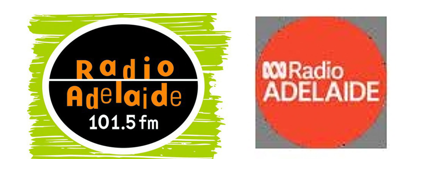ABC Radio’s proposed rebranding receives a poor reception in Adelaide
Trade marks – interlocutory injunction – whether serious question to be tried – whether actual non-monetary harm needs to be shown.
Educational Broadcasters Adelaide Incorporated v Australian Broadcasting Corporation [2016] FCA 1502
The applicant (EBA) owns a FM community radio station that has been on the air since 1972 under the name “5UV”, later “5UV Radio Adelaide” and, since 2003, simply “Radio Adelaide” (Station). EBA also owns a trade mark, 5UV RADIO ADELAIDE. In December 2016, EBA lodged applications for the mark RADIO ADELAIDE.
The respondent (the ABC) is the well known public broadcaster and, among other things, broadcasts radio throughout Australia on various AM frequencies that vary by State and Territory (and also can be accessed through other (non-radio) platforms). The ABC is proposing to rebrand its current Adelaide service from the current “891 ABC Adelaide” to “ABC Radio Adelaide”.
An example of the Station’s logo since 2003 (on the left) and the ABC’s proposed logo (which follows the pattern for the logos to be used in the other capital cities as part of a rebranding exercise by the ABC) are set out below:

The ABC’s proposed rebranding prompted EBA to bring an action for trade mark infringement and contravention of the Australian Consumer Law, including the present application for an interlocutory injunction. In the words of Justice Charlesworth, the ABC’s rebranding has “ignited passions among the Station’s listeners”, a matter on which EBA sought to rely in support of its application. While accepting evidence of some commonality between listeners of the Station and listeners of the ABC, as to consumer commentary on social media her Honour noted, “The debate rages under the artificial light of this very litigation and may not truly reflect the recognition by all relevant consumers of the words RADIO ADELAIDE in connection with the Station”.
The authors note that EBA’s trade mark claim (and, for that matter, its application for RADIO ADELAIDE) is not without potential difficulties. The ABC’s mark does not, for example, include the element “5UV”. The ABC indicated that it will contend at trial that it will not be using its mark as a trade mark, and will raise issues relating to whether the relevant marks are merely descriptive. Nevertheless, for the purposes of the interlocutory application her Honour was satisfied that there was a serious question to be tried, notwithstanding the possible impact of those issues on the strength of EBA’s claim.
Her Honour reached a similar conclusion on EBA’s consumer law claim. Her Honour placed “considerable weight” on the modality of the parties’ respective businesses, and the likely focus on the aural similarity of the competing marks. This is not to say that there was not also a serious question to be tried in relation to the (somewhat harder) claim based on visual depictions of the marks; her Honour’s conclusions in this regard extended to “all impugned varieties of use”.
As to balance of convenience, the ABC sought to argue that EBA’s assertions that it would incur “reputational harm” (in the sense of a diminishment of a trader’s good repute in a market) was not a form of loss recognised under the Trade Marks Act 1995 (Cth), and damages would be sufficient to compensate for any diminution in the value of the registered mark as an asset. It also argued that a (mistaken) perception of an association between the parties would not harm EBA’s reputation in any event, or at least EBA had not adduced evidence that such harm would arise.
Justice Charlesworth disagreed. As her Honour noted, the Act confers a statutory monopoly in respect of registered marks, the scope of which is defined by the Act itself, and the Act “recognises that incursion upon that statutory right is, in and of itself, harm that may be prevented by an injunction before any economic loss is suffered or proven”. A trade mark owner ought not be confined to monetary awards to protect its rights. Similarly, under the consumer law claim there is no need to show that the alleged contravener is a trader of questionable repute: “just as in private life one ought to be free to choose one’s friends, in commercial life one ought to be free to choose one’s trading affiliates”.
Her Honour was not satisfied with the ABC’s evidence concerning the potential impact of the injunction on the ABC’s rebranding. Among other things, it was unclear what the ABC proposed to do if the injunction were granted. Further, the ABC had been aware of the station’s existence for some time, but it did not inform EBA of the ABC’s intentions to rebrand to ABC Radio Adelaide until 1 December 2016 (albeit the ABC was under no obligation to do so). In the circumstances, the interlocutory injunction was granted.
